Positive and Negative Impacts of Imprisonment: Families & Individuals
VerifiedAdded on 2023/01/03
|7
|3086
|29
Essay
AI Summary
This essay provides a comprehensive analysis of the positive and negative impacts of imprisonment. It begins by defining imprisonment and outlining its effects on individuals and families, including psychological, social, and economic impacts. The essay explores arguments for and against imprisonment, examining how it affects crime rates and the lives of those incarcerated. It also discusses the impact on families, including the challenges faced by children with imprisoned parents and the social stigma associated with imprisonment. The essay further examines alternative approaches to imprisonment, such as house arrest, community service, and probation. It concludes by emphasizing the need for justice and the importance of considering the long-term consequences of imprisonment on both individuals and society, advocating for more humane and effective approaches to criminal justice.
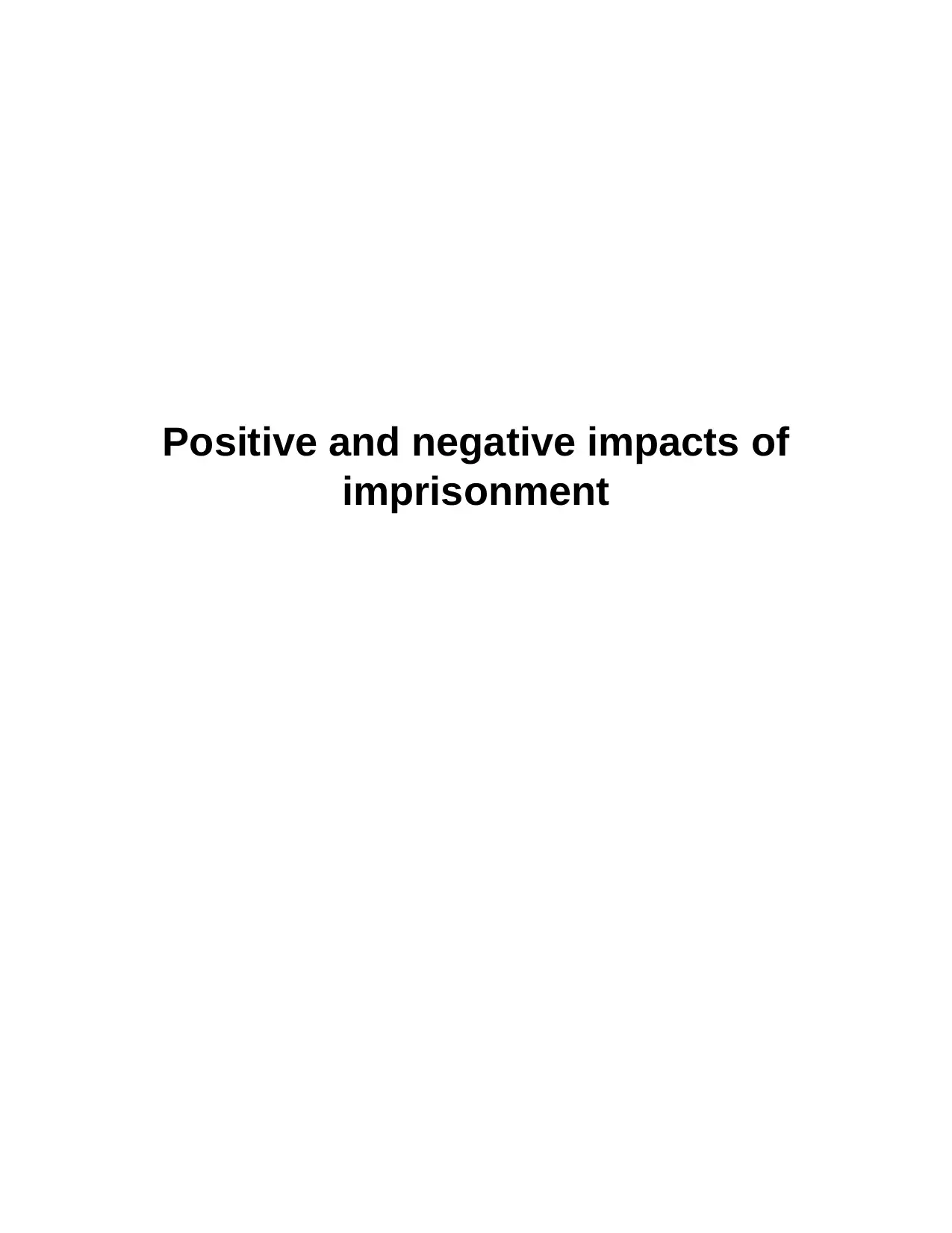
Positive and negative impacts of
imprisonment
imprisonment
Paraphrase This Document
Need a fresh take? Get an instant paraphrase of this document with our AI Paraphraser
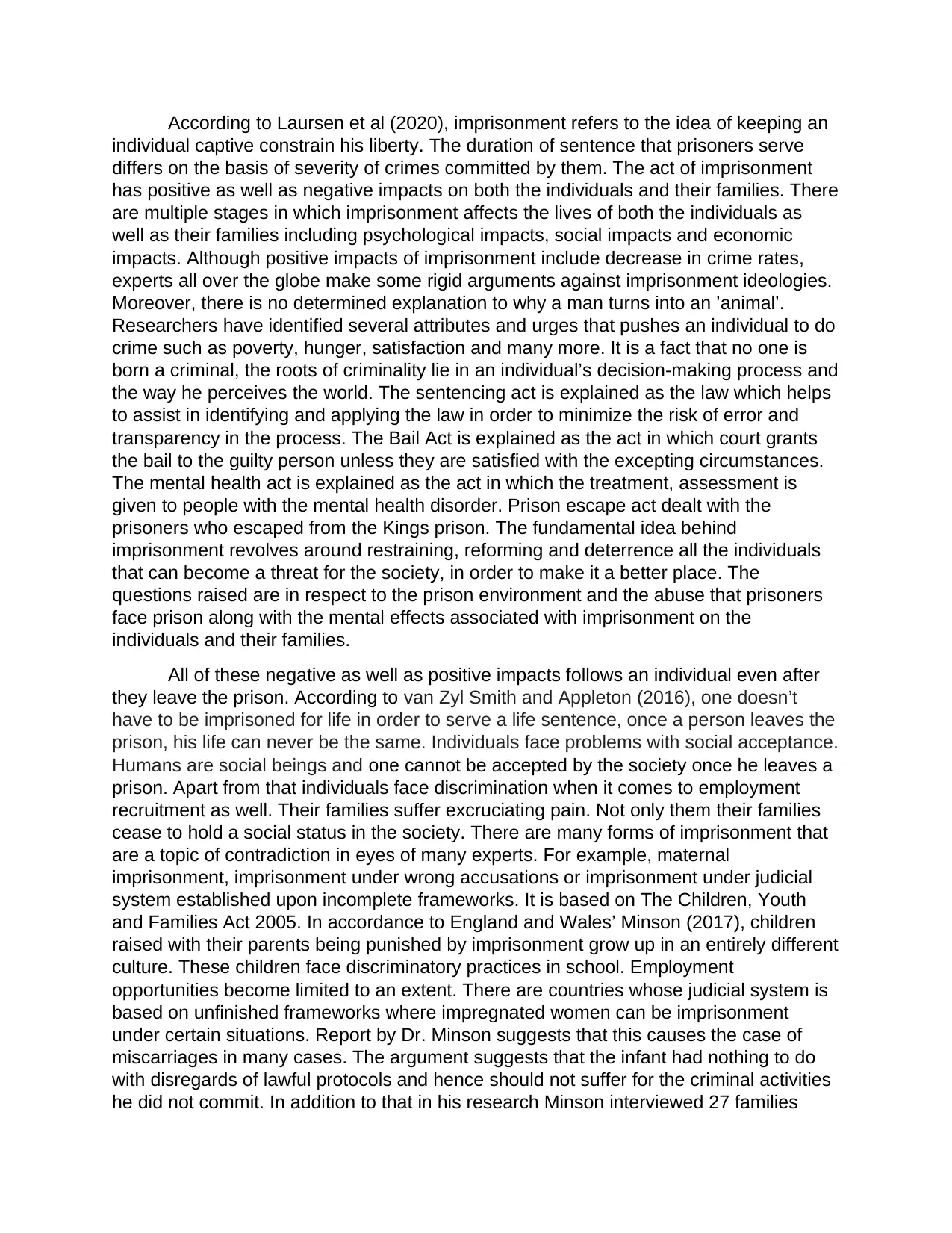
According to Laursen et al (2020), imprisonment refers to the idea of keeping an
individual captive constrain his liberty. The duration of sentence that prisoners serve
differs on the basis of severity of crimes committed by them. The act of imprisonment
has positive as well as negative impacts on both the individuals and their families. There
are multiple stages in which imprisonment affects the lives of both the individuals as
well as their families including psychological impacts, social impacts and economic
impacts. Although positive impacts of imprisonment include decrease in crime rates,
experts all over the globe make some rigid arguments against imprisonment ideologies.
Moreover, there is no determined explanation to why a man turns into an ’animal’.
Researchers have identified several attributes and urges that pushes an individual to do
crime such as poverty, hunger, satisfaction and many more. It is a fact that no one is
born a criminal, the roots of criminality lie in an individual’s decision-making process and
the way he perceives the world. The sentencing act is explained as the law which helps
to assist in identifying and applying the law in order to minimize the risk of error and
transparency in the process. The Bail Act is explained as the act in which court grants
the bail to the guilty person unless they are satisfied with the excepting circumstances.
The mental health act is explained as the act in which the treatment, assessment is
given to people with the mental health disorder. Prison escape act dealt with the
prisoners who escaped from the Kings prison. The fundamental idea behind
imprisonment revolves around restraining, reforming and deterrence all the individuals
that can become a threat for the society, in order to make it a better place. The
questions raised are in respect to the prison environment and the abuse that prisoners
face prison along with the mental effects associated with imprisonment on the
individuals and their families.
All of these negative as well as positive impacts follows an individual even after
they leave the prison. According to van Zyl Smith and Appleton (2016), one doesn’t
have to be imprisoned for life in order to serve a life sentence, once a person leaves the
prison, his life can never be the same. Individuals face problems with social acceptance.
Humans are social beings and one cannot be accepted by the society once he leaves a
prison. Apart from that individuals face discrimination when it comes to employment
recruitment as well. Their families suffer excruciating pain. Not only them their families
cease to hold a social status in the society. There are many forms of imprisonment that
are a topic of contradiction in eyes of many experts. For example, maternal
imprisonment, imprisonment under wrong accusations or imprisonment under judicial
system established upon incomplete frameworks. It is based on The Children, Youth
and Families Act 2005. In accordance to England and Wales’ Minson (2017), children
raised with their parents being punished by imprisonment grow up in an entirely different
culture. These children face discriminatory practices in school. Employment
opportunities become limited to an extent. There are countries whose judicial system is
based on unfinished frameworks where impregnated women can be imprisonment
under certain situations. Report by Dr. Minson suggests that this causes the case of
miscarriages in many cases. The argument suggests that the infant had nothing to do
with disregards of lawful protocols and hence should not suffer for the criminal activities
he did not commit. In addition to that in his research Minson interviewed 27 families
individual captive constrain his liberty. The duration of sentence that prisoners serve
differs on the basis of severity of crimes committed by them. The act of imprisonment
has positive as well as negative impacts on both the individuals and their families. There
are multiple stages in which imprisonment affects the lives of both the individuals as
well as their families including psychological impacts, social impacts and economic
impacts. Although positive impacts of imprisonment include decrease in crime rates,
experts all over the globe make some rigid arguments against imprisonment ideologies.
Moreover, there is no determined explanation to why a man turns into an ’animal’.
Researchers have identified several attributes and urges that pushes an individual to do
crime such as poverty, hunger, satisfaction and many more. It is a fact that no one is
born a criminal, the roots of criminality lie in an individual’s decision-making process and
the way he perceives the world. The sentencing act is explained as the law which helps
to assist in identifying and applying the law in order to minimize the risk of error and
transparency in the process. The Bail Act is explained as the act in which court grants
the bail to the guilty person unless they are satisfied with the excepting circumstances.
The mental health act is explained as the act in which the treatment, assessment is
given to people with the mental health disorder. Prison escape act dealt with the
prisoners who escaped from the Kings prison. The fundamental idea behind
imprisonment revolves around restraining, reforming and deterrence all the individuals
that can become a threat for the society, in order to make it a better place. The
questions raised are in respect to the prison environment and the abuse that prisoners
face prison along with the mental effects associated with imprisonment on the
individuals and their families.
All of these negative as well as positive impacts follows an individual even after
they leave the prison. According to van Zyl Smith and Appleton (2016), one doesn’t
have to be imprisoned for life in order to serve a life sentence, once a person leaves the
prison, his life can never be the same. Individuals face problems with social acceptance.
Humans are social beings and one cannot be accepted by the society once he leaves a
prison. Apart from that individuals face discrimination when it comes to employment
recruitment as well. Their families suffer excruciating pain. Not only them their families
cease to hold a social status in the society. There are many forms of imprisonment that
are a topic of contradiction in eyes of many experts. For example, maternal
imprisonment, imprisonment under wrong accusations or imprisonment under judicial
system established upon incomplete frameworks. It is based on The Children, Youth
and Families Act 2005. In accordance to England and Wales’ Minson (2017), children
raised with their parents being punished by imprisonment grow up in an entirely different
culture. These children face discriminatory practices in school. Employment
opportunities become limited to an extent. There are countries whose judicial system is
based on unfinished frameworks where impregnated women can be imprisonment
under certain situations. Report by Dr. Minson suggests that this causes the case of
miscarriages in many cases. The argument suggests that the infant had nothing to do
with disregards of lawful protocols and hence should not suffer for the criminal activities
he did not commit. In addition to that in his research Minson interviewed 27 families
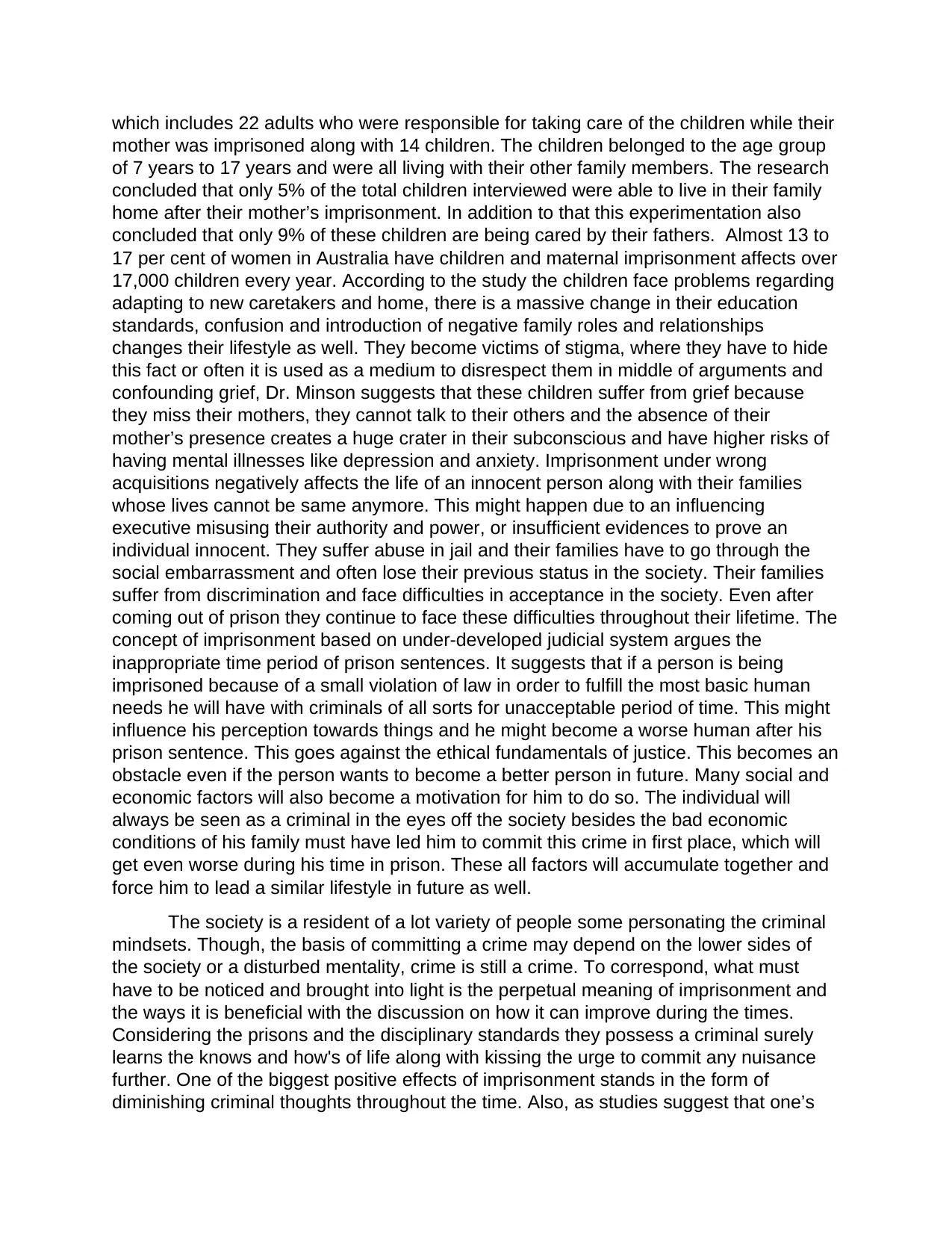
which includes 22 adults who were responsible for taking care of the children while their
mother was imprisoned along with 14 children. The children belonged to the age group
of 7 years to 17 years and were all living with their other family members. The research
concluded that only 5% of the total children interviewed were able to live in their family
home after their mother’s imprisonment. In addition to that this experimentation also
concluded that only 9% of these children are being cared by their fathers. Almost 13 to
17 per cent of women in Australia have children and maternal imprisonment affects over
17,000 children every year. According to the study the children face problems regarding
adapting to new caretakers and home, there is a massive change in their education
standards, confusion and introduction of negative family roles and relationships
changes their lifestyle as well. They become victims of stigma, where they have to hide
this fact or often it is used as a medium to disrespect them in middle of arguments and
confounding grief, Dr. Minson suggests that these children suffer from grief because
they miss their mothers, they cannot talk to their others and the absence of their
mother’s presence creates a huge crater in their subconscious and have higher risks of
having mental illnesses like depression and anxiety. Imprisonment under wrong
acquisitions negatively affects the life of an innocent person along with their families
whose lives cannot be same anymore. This might happen due to an influencing
executive misusing their authority and power, or insufficient evidences to prove an
individual innocent. They suffer abuse in jail and their families have to go through the
social embarrassment and often lose their previous status in the society. Their families
suffer from discrimination and face difficulties in acceptance in the society. Even after
coming out of prison they continue to face these difficulties throughout their lifetime. The
concept of imprisonment based on under-developed judicial system argues the
inappropriate time period of prison sentences. It suggests that if a person is being
imprisoned because of a small violation of law in order to fulfill the most basic human
needs he will have with criminals of all sorts for unacceptable period of time. This might
influence his perception towards things and he might become a worse human after his
prison sentence. This goes against the ethical fundamentals of justice. This becomes an
obstacle even if the person wants to become a better person in future. Many social and
economic factors will also become a motivation for him to do so. The individual will
always be seen as a criminal in the eyes off the society besides the bad economic
conditions of his family must have led him to commit this crime in first place, which will
get even worse during his time in prison. These all factors will accumulate together and
force him to lead a similar lifestyle in future as well.
The society is a resident of a lot variety of people some personating the criminal
mindsets. Though, the basis of committing a crime may depend on the lower sides of
the society or a disturbed mentality, crime is still a crime. To correspond, what must
have to be noticed and brought into light is the perpetual meaning of imprisonment and
the ways it is beneficial with the discussion on how it can improve during the times.
Considering the prisons and the disciplinary standards they possess a criminal surely
learns the knows and how's of life along with kissing the urge to commit any nuisance
further. One of the biggest positive effects of imprisonment stands in the form of
diminishing criminal thoughts throughout the time. Also, as studies suggest that one’s
mother was imprisoned along with 14 children. The children belonged to the age group
of 7 years to 17 years and were all living with their other family members. The research
concluded that only 5% of the total children interviewed were able to live in their family
home after their mother’s imprisonment. In addition to that this experimentation also
concluded that only 9% of these children are being cared by their fathers. Almost 13 to
17 per cent of women in Australia have children and maternal imprisonment affects over
17,000 children every year. According to the study the children face problems regarding
adapting to new caretakers and home, there is a massive change in their education
standards, confusion and introduction of negative family roles and relationships
changes their lifestyle as well. They become victims of stigma, where they have to hide
this fact or often it is used as a medium to disrespect them in middle of arguments and
confounding grief, Dr. Minson suggests that these children suffer from grief because
they miss their mothers, they cannot talk to their others and the absence of their
mother’s presence creates a huge crater in their subconscious and have higher risks of
having mental illnesses like depression and anxiety. Imprisonment under wrong
acquisitions negatively affects the life of an innocent person along with their families
whose lives cannot be same anymore. This might happen due to an influencing
executive misusing their authority and power, or insufficient evidences to prove an
individual innocent. They suffer abuse in jail and their families have to go through the
social embarrassment and often lose their previous status in the society. Their families
suffer from discrimination and face difficulties in acceptance in the society. Even after
coming out of prison they continue to face these difficulties throughout their lifetime. The
concept of imprisonment based on under-developed judicial system argues the
inappropriate time period of prison sentences. It suggests that if a person is being
imprisoned because of a small violation of law in order to fulfill the most basic human
needs he will have with criminals of all sorts for unacceptable period of time. This might
influence his perception towards things and he might become a worse human after his
prison sentence. This goes against the ethical fundamentals of justice. This becomes an
obstacle even if the person wants to become a better person in future. Many social and
economic factors will also become a motivation for him to do so. The individual will
always be seen as a criminal in the eyes off the society besides the bad economic
conditions of his family must have led him to commit this crime in first place, which will
get even worse during his time in prison. These all factors will accumulate together and
force him to lead a similar lifestyle in future as well.
The society is a resident of a lot variety of people some personating the criminal
mindsets. Though, the basis of committing a crime may depend on the lower sides of
the society or a disturbed mentality, crime is still a crime. To correspond, what must
have to be noticed and brought into light is the perpetual meaning of imprisonment and
the ways it is beneficial with the discussion on how it can improve during the times.
Considering the prisons and the disciplinary standards they possess a criminal surely
learns the knows and how's of life along with kissing the urge to commit any nuisance
further. One of the biggest positive effects of imprisonment stands in the form of
diminishing criminal thoughts throughout the time. Also, as studies suggest that one’s
⊘ This is a preview!⊘
Do you want full access?
Subscribe today to unlock all pages.

Trusted by 1+ million students worldwide
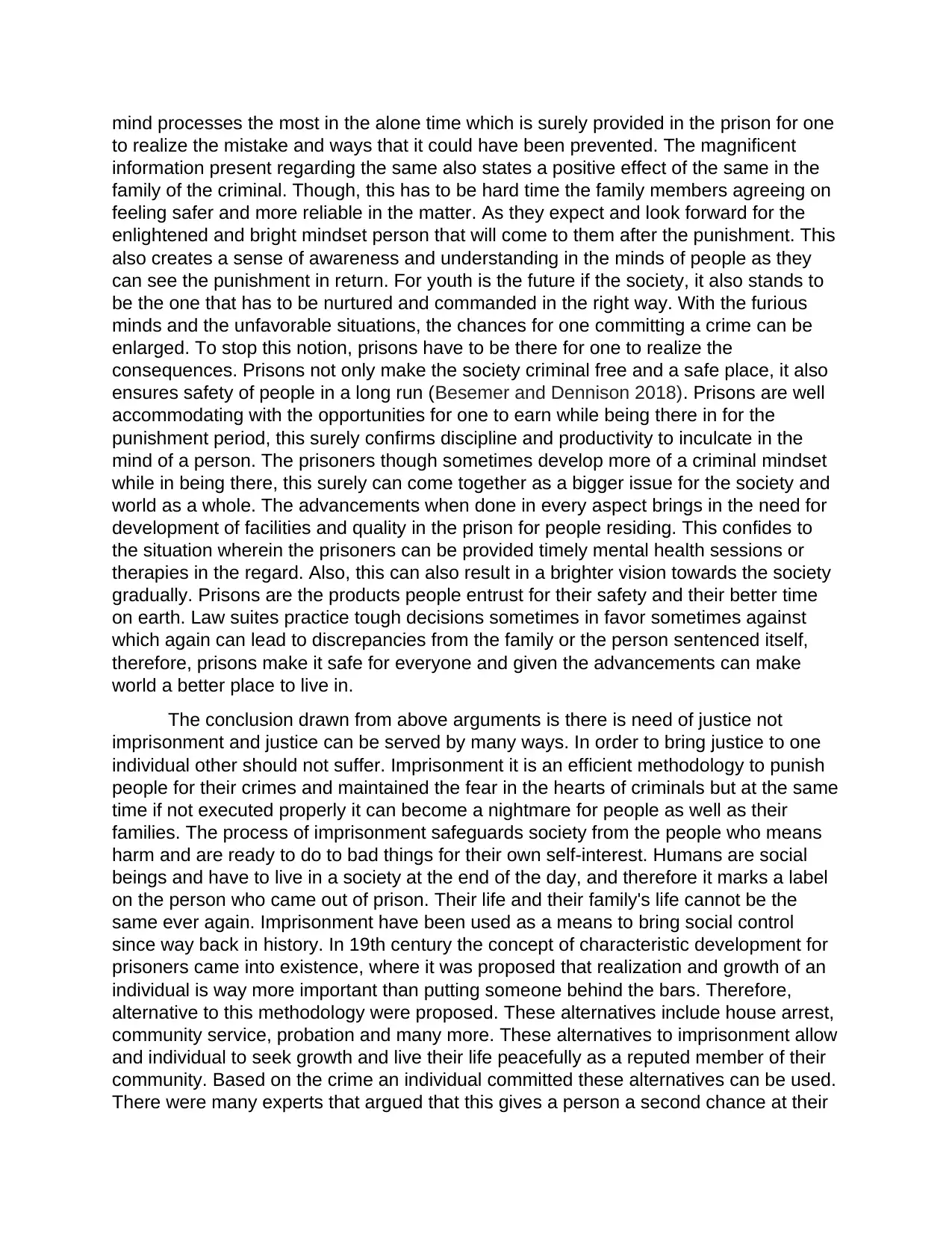
mind processes the most in the alone time which is surely provided in the prison for one
to realize the mistake and ways that it could have been prevented. The magnificent
information present regarding the same also states a positive effect of the same in the
family of the criminal. Though, this has to be hard time the family members agreeing on
feeling safer and more reliable in the matter. As they expect and look forward for the
enlightened and bright mindset person that will come to them after the punishment. This
also creates a sense of awareness and understanding in the minds of people as they
can see the punishment in return. For youth is the future if the society, it also stands to
be the one that has to be nurtured and commanded in the right way. With the furious
minds and the unfavorable situations, the chances for one committing a crime can be
enlarged. To stop this notion, prisons have to be there for one to realize the
consequences. Prisons not only make the society criminal free and a safe place, it also
ensures safety of people in a long run (Besemer and Dennison 2018). Prisons are well
accommodating with the opportunities for one to earn while being there in for the
punishment period, this surely confirms discipline and productivity to inculcate in the
mind of a person. The prisoners though sometimes develop more of a criminal mindset
while in being there, this surely can come together as a bigger issue for the society and
world as a whole. The advancements when done in every aspect brings in the need for
development of facilities and quality in the prison for people residing. This confides to
the situation wherein the prisoners can be provided timely mental health sessions or
therapies in the regard. Also, this can also result in a brighter vision towards the society
gradually. Prisons are the products people entrust for their safety and their better time
on earth. Law suites practice tough decisions sometimes in favor sometimes against
which again can lead to discrepancies from the family or the person sentenced itself,
therefore, prisons make it safe for everyone and given the advancements can make
world a better place to live in.
The conclusion drawn from above arguments is there is need of justice not
imprisonment and justice can be served by many ways. In order to bring justice to one
individual other should not suffer. Imprisonment it is an efficient methodology to punish
people for their crimes and maintained the fear in the hearts of criminals but at the same
time if not executed properly it can become a nightmare for people as well as their
families. The process of imprisonment safeguards society from the people who means
harm and are ready to do to bad things for their own self-interest. Humans are social
beings and have to live in a society at the end of the day, and therefore it marks a label
on the person who came out of prison. Their life and their family's life cannot be the
same ever again. Imprisonment have been used as a means to bring social control
since way back in history. In 19th century the concept of characteristic development for
prisoners came into existence, where it was proposed that realization and growth of an
individual is way more important than putting someone behind the bars. Therefore,
alternative to this methodology were proposed. These alternatives include house arrest,
community service, probation and many more. These alternatives to imprisonment allow
and individual to seek growth and live their life peacefully as a reputed member of their
community. Based on the crime an individual committed these alternatives can be used.
There were many experts that argued that this gives a person a second chance at their
to realize the mistake and ways that it could have been prevented. The magnificent
information present regarding the same also states a positive effect of the same in the
family of the criminal. Though, this has to be hard time the family members agreeing on
feeling safer and more reliable in the matter. As they expect and look forward for the
enlightened and bright mindset person that will come to them after the punishment. This
also creates a sense of awareness and understanding in the minds of people as they
can see the punishment in return. For youth is the future if the society, it also stands to
be the one that has to be nurtured and commanded in the right way. With the furious
minds and the unfavorable situations, the chances for one committing a crime can be
enlarged. To stop this notion, prisons have to be there for one to realize the
consequences. Prisons not only make the society criminal free and a safe place, it also
ensures safety of people in a long run (Besemer and Dennison 2018). Prisons are well
accommodating with the opportunities for one to earn while being there in for the
punishment period, this surely confirms discipline and productivity to inculcate in the
mind of a person. The prisoners though sometimes develop more of a criminal mindset
while in being there, this surely can come together as a bigger issue for the society and
world as a whole. The advancements when done in every aspect brings in the need for
development of facilities and quality in the prison for people residing. This confides to
the situation wherein the prisoners can be provided timely mental health sessions or
therapies in the regard. Also, this can also result in a brighter vision towards the society
gradually. Prisons are the products people entrust for their safety and their better time
on earth. Law suites practice tough decisions sometimes in favor sometimes against
which again can lead to discrepancies from the family or the person sentenced itself,
therefore, prisons make it safe for everyone and given the advancements can make
world a better place to live in.
The conclusion drawn from above arguments is there is need of justice not
imprisonment and justice can be served by many ways. In order to bring justice to one
individual other should not suffer. Imprisonment it is an efficient methodology to punish
people for their crimes and maintained the fear in the hearts of criminals but at the same
time if not executed properly it can become a nightmare for people as well as their
families. The process of imprisonment safeguards society from the people who means
harm and are ready to do to bad things for their own self-interest. Humans are social
beings and have to live in a society at the end of the day, and therefore it marks a label
on the person who came out of prison. Their life and their family's life cannot be the
same ever again. Imprisonment have been used as a means to bring social control
since way back in history. In 19th century the concept of characteristic development for
prisoners came into existence, where it was proposed that realization and growth of an
individual is way more important than putting someone behind the bars. Therefore,
alternative to this methodology were proposed. These alternatives include house arrest,
community service, probation and many more. These alternatives to imprisonment allow
and individual to seek growth and live their life peacefully as a reputed member of their
community. Based on the crime an individual committed these alternatives can be used.
There were many experts that argued that this gives a person a second chance at their
Paraphrase This Document
Need a fresh take? Get an instant paraphrase of this document with our AI Paraphraser
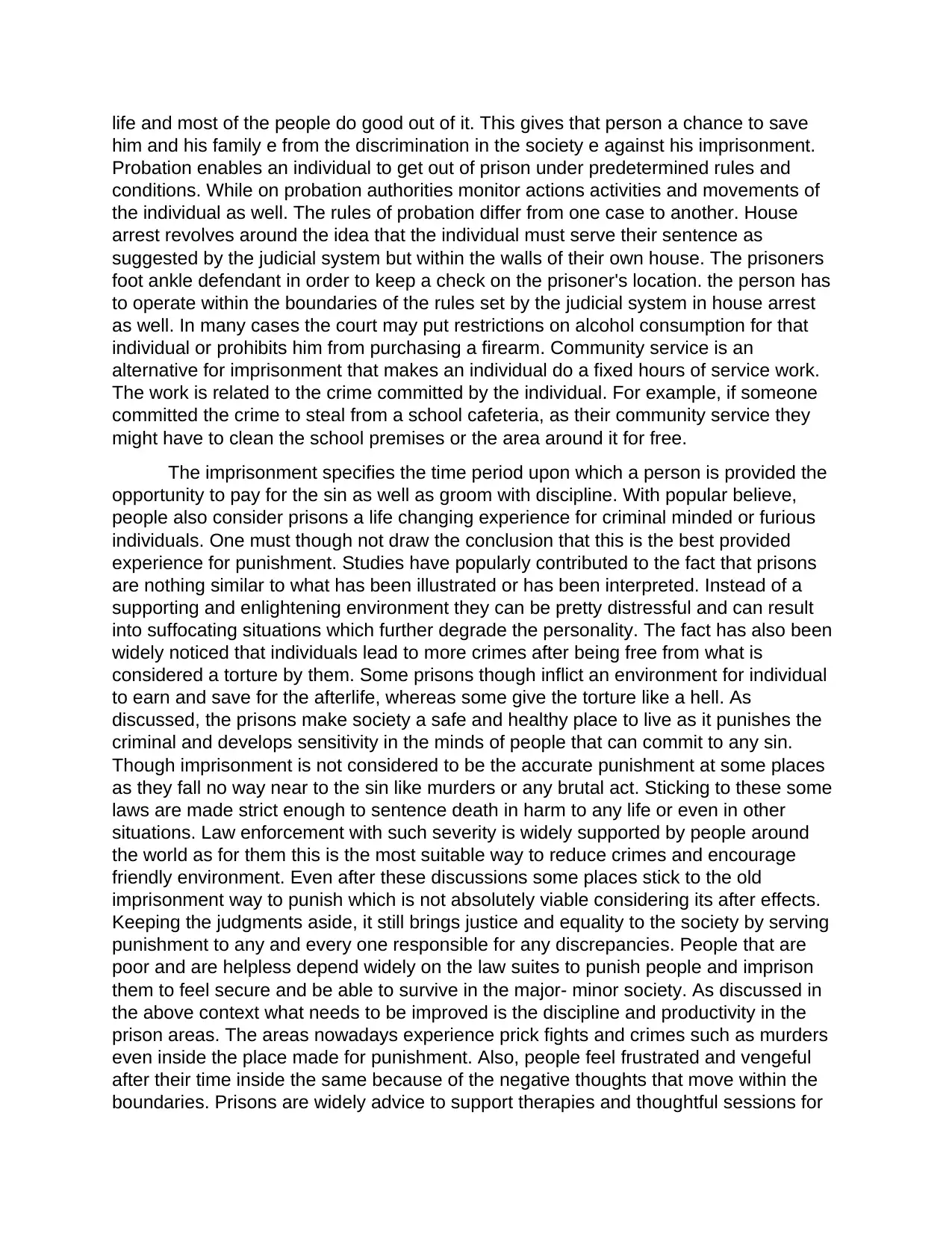
life and most of the people do good out of it. This gives that person a chance to save
him and his family e from the discrimination in the society e against his imprisonment.
Probation enables an individual to get out of prison under predetermined rules and
conditions. While on probation authorities monitor actions activities and movements of
the individual as well. The rules of probation differ from one case to another. House
arrest revolves around the idea that the individual must serve their sentence as
suggested by the judicial system but within the walls of their own house. The prisoners
foot ankle defendant in order to keep a check on the prisoner's location. the person has
to operate within the boundaries of the rules set by the judicial system in house arrest
as well. In many cases the court may put restrictions on alcohol consumption for that
individual or prohibits him from purchasing a firearm. Community service is an
alternative for imprisonment that makes an individual do a fixed hours of service work.
The work is related to the crime committed by the individual. For example, if someone
committed the crime to steal from a school cafeteria, as their community service they
might have to clean the school premises or the area around it for free.
The imprisonment specifies the time period upon which a person is provided the
opportunity to pay for the sin as well as groom with discipline. With popular believe,
people also consider prisons a life changing experience for criminal minded or furious
individuals. One must though not draw the conclusion that this is the best provided
experience for punishment. Studies have popularly contributed to the fact that prisons
are nothing similar to what has been illustrated or has been interpreted. Instead of a
supporting and enlightening environment they can be pretty distressful and can result
into suffocating situations which further degrade the personality. The fact has also been
widely noticed that individuals lead to more crimes after being free from what is
considered a torture by them. Some prisons though inflict an environment for individual
to earn and save for the afterlife, whereas some give the torture like a hell. As
discussed, the prisons make society a safe and healthy place to live as it punishes the
criminal and develops sensitivity in the minds of people that can commit to any sin.
Though imprisonment is not considered to be the accurate punishment at some places
as they fall no way near to the sin like murders or any brutal act. Sticking to these some
laws are made strict enough to sentence death in harm to any life or even in other
situations. Law enforcement with such severity is widely supported by people around
the world as for them this is the most suitable way to reduce crimes and encourage
friendly environment. Even after these discussions some places stick to the old
imprisonment way to punish which is not absolutely viable considering its after effects.
Keeping the judgments aside, it still brings justice and equality to the society by serving
punishment to any and every one responsible for any discrepancies. People that are
poor and are helpless depend widely on the law suites to punish people and imprison
them to feel secure and be able to survive in the major- minor society. As discussed in
the above context what needs to be improved is the discipline and productivity in the
prison areas. The areas nowadays experience prick fights and crimes such as murders
even inside the place made for punishment. Also, people feel frustrated and vengeful
after their time inside the same because of the negative thoughts that move within the
boundaries. Prisons are widely advice to support therapies and thoughtful sessions for
him and his family e from the discrimination in the society e against his imprisonment.
Probation enables an individual to get out of prison under predetermined rules and
conditions. While on probation authorities monitor actions activities and movements of
the individual as well. The rules of probation differ from one case to another. House
arrest revolves around the idea that the individual must serve their sentence as
suggested by the judicial system but within the walls of their own house. The prisoners
foot ankle defendant in order to keep a check on the prisoner's location. the person has
to operate within the boundaries of the rules set by the judicial system in house arrest
as well. In many cases the court may put restrictions on alcohol consumption for that
individual or prohibits him from purchasing a firearm. Community service is an
alternative for imprisonment that makes an individual do a fixed hours of service work.
The work is related to the crime committed by the individual. For example, if someone
committed the crime to steal from a school cafeteria, as their community service they
might have to clean the school premises or the area around it for free.
The imprisonment specifies the time period upon which a person is provided the
opportunity to pay for the sin as well as groom with discipline. With popular believe,
people also consider prisons a life changing experience for criminal minded or furious
individuals. One must though not draw the conclusion that this is the best provided
experience for punishment. Studies have popularly contributed to the fact that prisons
are nothing similar to what has been illustrated or has been interpreted. Instead of a
supporting and enlightening environment they can be pretty distressful and can result
into suffocating situations which further degrade the personality. The fact has also been
widely noticed that individuals lead to more crimes after being free from what is
considered a torture by them. Some prisons though inflict an environment for individual
to earn and save for the afterlife, whereas some give the torture like a hell. As
discussed, the prisons make society a safe and healthy place to live as it punishes the
criminal and develops sensitivity in the minds of people that can commit to any sin.
Though imprisonment is not considered to be the accurate punishment at some places
as they fall no way near to the sin like murders or any brutal act. Sticking to these some
laws are made strict enough to sentence death in harm to any life or even in other
situations. Law enforcement with such severity is widely supported by people around
the world as for them this is the most suitable way to reduce crimes and encourage
friendly environment. Even after these discussions some places stick to the old
imprisonment way to punish which is not absolutely viable considering its after effects.
Keeping the judgments aside, it still brings justice and equality to the society by serving
punishment to any and every one responsible for any discrepancies. People that are
poor and are helpless depend widely on the law suites to punish people and imprison
them to feel secure and be able to survive in the major- minor society. As discussed in
the above context what needs to be improved is the discipline and productivity in the
prison areas. The areas nowadays experience prick fights and crimes such as murders
even inside the place made for punishment. Also, people feel frustrated and vengeful
after their time inside the same because of the negative thoughts that move within the
boundaries. Prisons are widely advice to support therapies and thoughtful sessions for
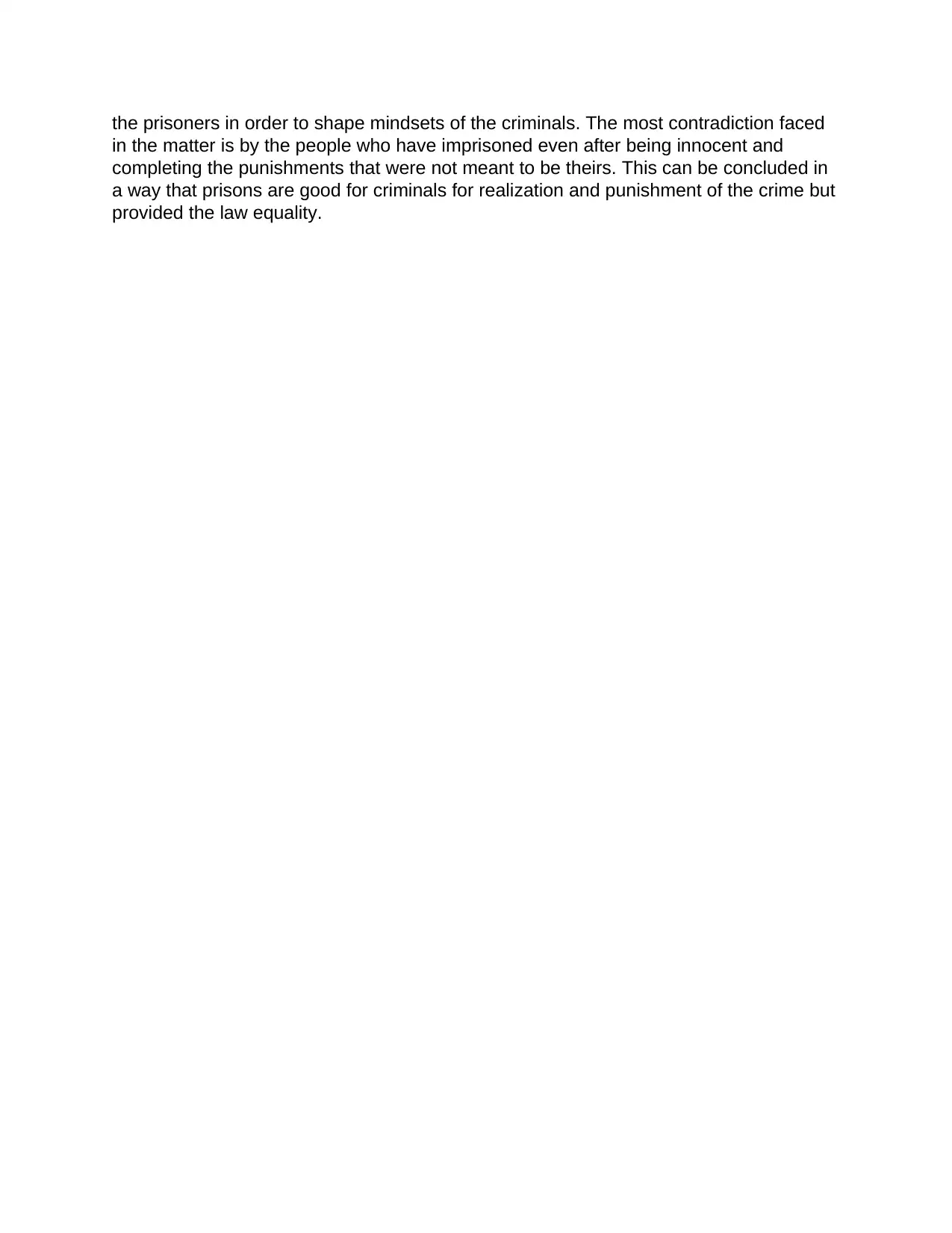
the prisoners in order to shape mindsets of the criminals. The most contradiction faced
in the matter is by the people who have imprisoned even after being innocent and
completing the punishments that were not meant to be theirs. This can be concluded in
a way that prisons are good for criminals for realization and punishment of the crime but
provided the law equality.
in the matter is by the people who have imprisoned even after being innocent and
completing the punishments that were not meant to be theirs. This can be concluded in
a way that prisons are good for criminals for realization and punishment of the crime but
provided the law equality.
⊘ This is a preview!⊘
Do you want full access?
Subscribe today to unlock all pages.

Trusted by 1+ million students worldwide
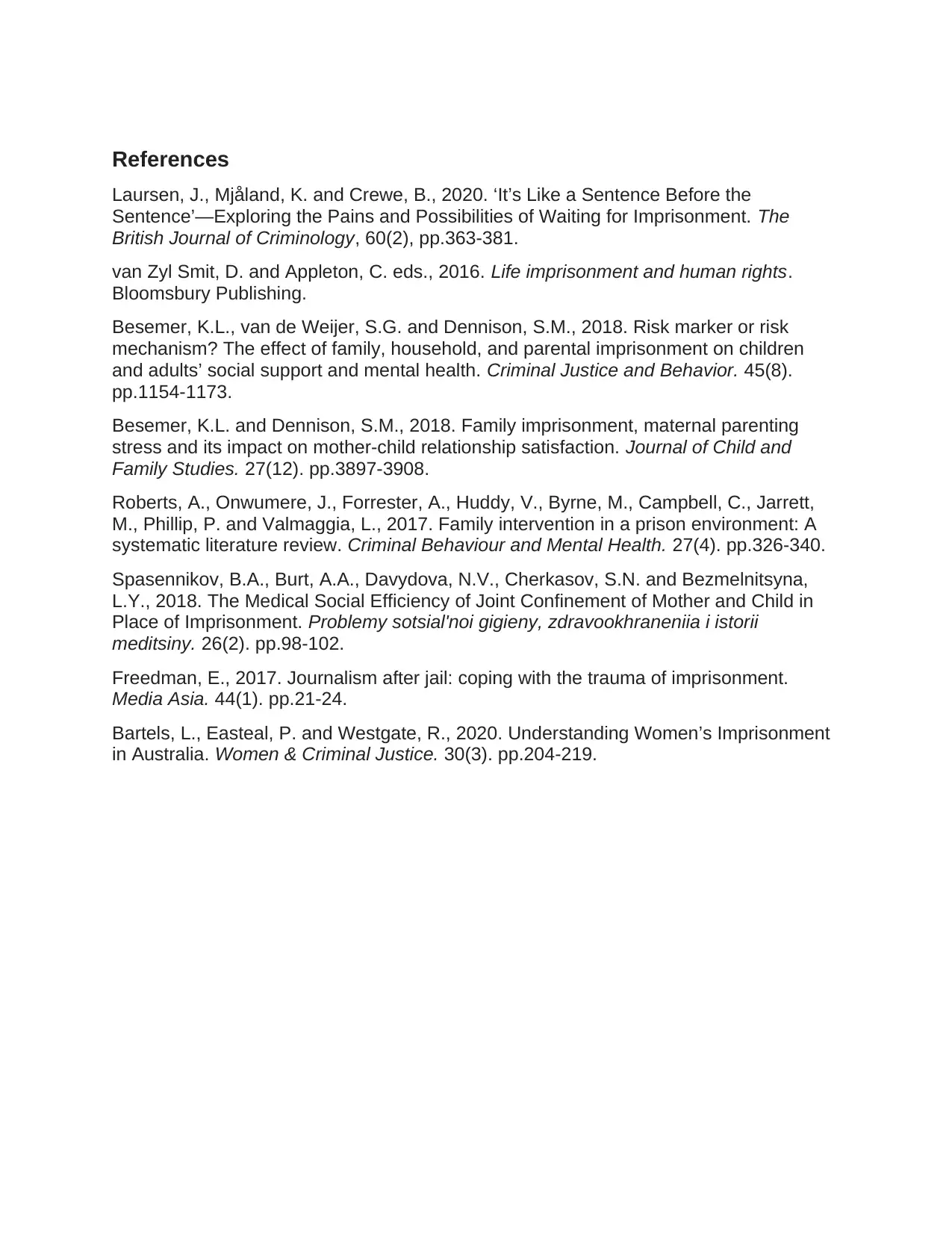
References
Laursen, J., Mjåland, K. and Crewe, B., 2020. ‘It’s Like a Sentence Before the
Sentence’—Exploring the Pains and Possibilities of Waiting for Imprisonment. The
British Journal of Criminology, 60(2), pp.363-381.
van Zyl Smit, D. and Appleton, C. eds., 2016. Life imprisonment and human rights.
Bloomsbury Publishing.
Besemer, K.L., van de Weijer, S.G. and Dennison, S.M., 2018. Risk marker or risk
mechanism? The effect of family, household, and parental imprisonment on children
and adults’ social support and mental health. Criminal Justice and Behavior. 45(8).
pp.1154-1173.
Besemer, K.L. and Dennison, S.M., 2018. Family imprisonment, maternal parenting
stress and its impact on mother-child relationship satisfaction. Journal of Child and
Family Studies. 27(12). pp.3897-3908.
Roberts, A., Onwumere, J., Forrester, A., Huddy, V., Byrne, M., Campbell, C., Jarrett,
M., Phillip, P. and Valmaggia, L., 2017. Family intervention in a prison environment: A
systematic literature review. Criminal Behaviour and Mental Health. 27(4). pp.326-340.
Spasennikov, B.A., Burt, A.A., Davydova, N.V., Cherkasov, S.N. and Bezmelnitsyna,
L.Y., 2018. The Medical Social Efficiency of Joint Confinement of Mother and Child in
Place of Imprisonment. Problemy sotsial'noi gigieny, zdravookhraneniia i istorii
meditsiny. 26(2). pp.98-102.
Freedman, E., 2017. Journalism after jail: coping with the trauma of imprisonment.
Media Asia. 44(1). pp.21-24.
Bartels, L., Easteal, P. and Westgate, R., 2020. Understanding Women’s Imprisonment
in Australia. Women & Criminal Justice. 30(3). pp.204-219.
Laursen, J., Mjåland, K. and Crewe, B., 2020. ‘It’s Like a Sentence Before the
Sentence’—Exploring the Pains and Possibilities of Waiting for Imprisonment. The
British Journal of Criminology, 60(2), pp.363-381.
van Zyl Smit, D. and Appleton, C. eds., 2016. Life imprisonment and human rights.
Bloomsbury Publishing.
Besemer, K.L., van de Weijer, S.G. and Dennison, S.M., 2018. Risk marker or risk
mechanism? The effect of family, household, and parental imprisonment on children
and adults’ social support and mental health. Criminal Justice and Behavior. 45(8).
pp.1154-1173.
Besemer, K.L. and Dennison, S.M., 2018. Family imprisonment, maternal parenting
stress and its impact on mother-child relationship satisfaction. Journal of Child and
Family Studies. 27(12). pp.3897-3908.
Roberts, A., Onwumere, J., Forrester, A., Huddy, V., Byrne, M., Campbell, C., Jarrett,
M., Phillip, P. and Valmaggia, L., 2017. Family intervention in a prison environment: A
systematic literature review. Criminal Behaviour and Mental Health. 27(4). pp.326-340.
Spasennikov, B.A., Burt, A.A., Davydova, N.V., Cherkasov, S.N. and Bezmelnitsyna,
L.Y., 2018. The Medical Social Efficiency of Joint Confinement of Mother and Child in
Place of Imprisonment. Problemy sotsial'noi gigieny, zdravookhraneniia i istorii
meditsiny. 26(2). pp.98-102.
Freedman, E., 2017. Journalism after jail: coping with the trauma of imprisonment.
Media Asia. 44(1). pp.21-24.
Bartels, L., Easteal, P. and Westgate, R., 2020. Understanding Women’s Imprisonment
in Australia. Women & Criminal Justice. 30(3). pp.204-219.
1 out of 7
Related Documents
Your All-in-One AI-Powered Toolkit for Academic Success.
+13062052269
info@desklib.com
Available 24*7 on WhatsApp / Email
![[object Object]](/_next/static/media/star-bottom.7253800d.svg)
Unlock your academic potential
Copyright © 2020–2026 A2Z Services. All Rights Reserved. Developed and managed by ZUCOL.





